

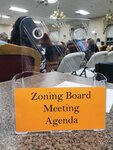
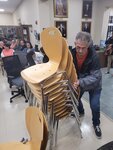
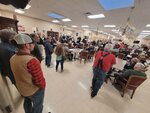
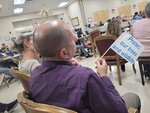
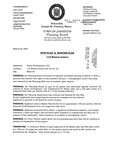
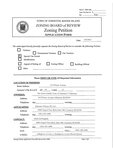
Editor’s Note: This is the third installment of a series looking at the newest iteration of the proposed Winsor Avenue solar farm. The series is expected to conclude following the Nov. 2 continuation of the Zoning Board special use permit hearing.
Guess how many times Johnston’s Comprehensive Plan, within its more than 500 pages, mentions the word “solar.”
According to Stop Johnston Solar Attorney Matt Landry, the answer is a big fat zero.
During a Sept. 28 Zoning Board public hearing, Landry questioned Cranston-based Green Development’s witness, Joseph D. Lombardo, president of JDL Enterprises.
“Have you reviewed the Johnston Comprehensive Plan in connection with this application?” Landry asked Lombardo. “That document’s approximately 500 pages, 600 pages?”
“It’s lengthy,” replied the witness, who testified that a massive solar project pitched for a residential neighborhood in Johnston would adhere to the town’s planning and zoning laws. “My review typically centers around the land use element.”
“Isn’t it correct that the Johnston Comprehensive Plan is dated 2007?” Landry asked.
“It ‘s my understanding of state law is it’s still binding,” Lombardo replied.
Landry quickly asked a follow-up question: “Under state law isn’t a municipality required to update their Comprehensive Plan every 10 years?”
The witness answered: “Yes.”
“Johnston has failed to do so, correct?” asked Landry.
“As far as I know,” Lombardo answered.
Tardy Planning
Johnston should have updated its Comprehensive Plan by 2017, according to Rhode Island state law. Although the town failed to do so five years ago, they’ve started the process, with updates tucked at the end of Planning Board agendas.
Opponents of the proposed solar development initially called for an update of the town’s Comprehensive Plan to regulate the construction of industrial-scale solar projects Johnston’s in residential neighborhoods.
Town Council Member Robert J. Civetti helped to draft a solar ordinance, aimed at addressing the green energy aspect missing from many of town planning and zoning laws (there were no large-scale solar fields 15 years ago when the plan was last updated). His ordinance died for lack of a second when no other council members would support it.
The Green Development whose proposal was initially rejected by the board in April 2022, has once again applied for a special use permit to build on nearly 160 acres of woodland zoned for residential use.
This time, the project has been shaved down a slight bit, to 19MW (down 5 MW from their previous 24MW proposal). Green argues it’s a “20% reduction in overall panel surface area.” Landry, however, argues the reduction in total site coverage will actually measure closer to a 5% reduction in overall project scope.
Reconciling Obsolescence
No matter the pitch, the two sides are struggling over the interpretation of outdated town zoning laws.
“I think I asked you this last time, in that Comprehensive planning document, how many times does it mention solar?” Landry asked Lombardo.
“I think I answered I didn’t know,” he answered. “I don’t know.”
“Would you be surprised to know that in that entire document ‘solar’ is not mentioned once?” Landry asked.
The crowd gathered at the Johnston Senior Center grew silent for a moment.
“Probably due to the date,” Lombardo admitted. “Considering that they probably started writing it in 2005, adopted in 2007, there’s a good chance it wasn’t contemplated then.”
The town’s Comprehensive Plan is arguably one of local government’s most important documents.
“Would you say that the Comprehensive Plan provides a roadmap for the town to follow?” Landry asked the witness.
“It does in a certain way,” answered Lombardo.
Landry stepped back and rephrased his line of questioning.
“Is it fair to say that the zoning ordinance is the implementation tool for the Comprehensive Plan? And the zoning ordinances must be consistent with the Comprehensive Plan to be valid?”
Lombardo answered carefully: “There’s some court cases on that where it’s been shown the zoning can actually trump the comprehensive plan in some instances.”
Landry followed up fast: “If the zoning ordinance is an implementation tool, how can the Johnston Zoning Ordinance implement and regulate solar if it’s never mentioned in the Comprehensive Plan?”
Lombardo said that sometimes land-uses emerge over time and local boards must reconcile proposals with existing town regulations. He gave the example of “telecommunications towers.”
“They can handle it in a number of different ways,” Lombardo testified.
“There’s no definitive solar use, or prescribed solar use, in the town of Johnston?” Landry asked.
“I did not see it,” the witness answered.
Green Development is seeking the special use permit under the category of an “electric power generating plant, however fueled.”
“That’s allowed as a special use permit in this district?” Landry asked Lombardo.
“In this district and literally every one except for one … so almost the entire town,” he answered.
Landry wondered allowed whether there’s a state agency that regulates public utilities (there is, the Rhode Island Public Utilities Commission).
“Is it your testimony that the applicant constitutes a public utility?” Landry asked.
“Well, to be honest with you, there’s no definition of that in the ordinance so I can’t say how the town of Johnston considers it … So again, I rely on the zoning official to interpret that,” Lombardo answered. “I’m assuming that it has been referenced that way so that any solar project could go forward in this town and this is not the first one to go forward.”
Planning for a profit
The proposed solar site includes a historic farmstead and agricultural fields on the top of Sikkibunkiaut Hill, a Rhode Island Historical Cemetery and isolated pockets of wetland off Winsor Avenue. Clear-cutting will be needed to accommodate nearly 50,000 industrial-sized solar panels on about 157 acres of land.
The Zoning Board members — Chairman Thomas Lopardo, and members Anthony Pilozzi, Joseph Anzelone, Charles Ainabe and Richard Fascia; as well as alternates Dennis Cardillo and Albert Colannino — sat silently throughout the testimony. They asked no questions on Sept. 28. Nearly 200 residents packed the meeting, which dragged on until 10:30 p.m. The zoning board had already declared, at the start of the hearing, that testimony would conclude after 3.5 hours and resume on Nov. 2.
Landry wrapped up his cross-examination of Green Development’s witness prior to adjournment.
He asked Lombardo “if the purpose of this project is to get a profit?”
“I’m sure they wouldn’t be in business otherwise,” the witness answered.
“Would you say that it’s a commercial enterprise?” Landry asked.
“It’s a business enterprise,” Lombardo answered.
Editor’s Note: Look for Part 4 of this series following the Nov. 2 continuation of the Sept. 28 public hearing.
Email Editor Rory Schuler at rorys@rhodybeat.com if you have letters to the editor, comments, tips or questions. Check out the links below to catch up on the rest of the series.
WINSOR FARM REDUX PART 1
WINSOR FARM REDUX PART 2:
WINSOR FARM REDUX PART 3:
Comments
No comments on this item Please log in to comment by clicking here